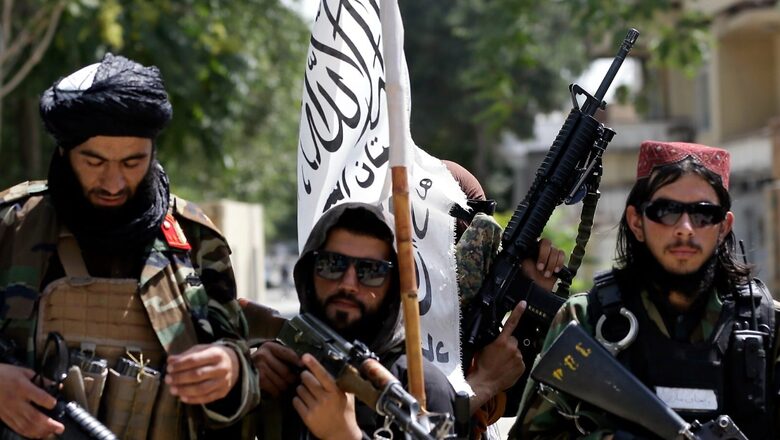
views
The dust will not settle in Afghanistan soon enough. And neither would there be peace. Tension in the air of Afghanistan and its neighboring states is palpable as things may get out of control anytime. But nevertheless, Taliban in Kabul and Taliban as de facto ruler of Afghanistan is a reality now.
The West, led by US, has simply abandoned or rather fled from Afghanistan and would not return anytime soon. Instead, from the comfort of their home turf, they would give grand lectures and would desperately look for clues to propagate the theory that Taliban 2.0 are a “reformed lot”. It would be done to rationalise their own moves and may have nothing to do with the brutality of Taliban in reality. Not only the US left Afghanistan, but also left behind a massive arsenal of weapon systems that have now landed in the hands of Taliban, making them more formidable than they were two decades ago.
The Immediate Fundamental Challenge
At its core, there is not much difference between the likes of Boko Haram, ISIS, Al Qaeda or Taliban. Each is almost a mirror reflection of the other in their primitive savagery, deranged practices, obnoxious ideologies and disdain for other religions. Each, incidentally, gets inspired from the other as well. Therefore, the immediate outcome of Taliban’s blitzkrieg like takeover of most of Afghanistan including Kabul, is that it would inspire many similar terror groups to fancy their own chances of toppling legitimate governments and take over the mantle. The likes of Lashkar-e-Taiba, Jaish-e-Mohammad, Lashkar-e-Jhangvi, Tehreek-e-Taliban Pakistan (TTP), East Turkistan Islamic Movement, having interest in Xingjian province of China, or the Al Qaeda and ISIS affiliates in Central Asia, South Asia, and elsewhere, may not shy away from renewed offensives against respective sovereign governments.
Further, the proliferation of Taliban would invariably end up in creating an ecosystem in Afghanistan that would make it a breeding ground for next generation of radical terror groups with aspirations of setting up Islamic Caliphates in different parts of the world.
Luckily, India Abrogated Article 370 on Time
For those analysts who have been studying the activities of non-state actors in South Asia for long, know how India was affected three decades ago when in a similar fashion US had moved out of Afghanistan leaving behind an army of trained, armed and radicalized Mujahideens. The first wave of terrorism in Kashmir in 1989-90 was triggered by Afghan Mujhadeens brought in the Valley by Pakistan’s ISI.
Three decades down the line, not only India has an array of extremely well trained and battle-hardened security forces who have mastered the art of neutralising terrorists with precision, but also, the importance and efficacy of the abrogation of Article 370 by the Modi government that led to direct control of security and administrative affairs of J&K by the Central government, can never be underestimated. It has led to drastic reductions in incidents of stone pelting, severe crackdown on radicalisation architecture and terror financing networks, as well as systematic elimination of top and middle run leadership of most of the major terror groups operating in the Valley.
Or else, had things been like before the Abrogation of Article 370, with separatists having a free run, one shudders to think how things would have shaped up in J&K as a result of Taliban’s blitzkrieg and Afghan Army’s complete capitulation. If one goes by the precedence of the past, Kashmir would have been on the boil again, instead of hoisting the Indian national flag en masse on this Independence Day. ISI would not have spared any opportunity to repeat the spread of mayhem. However, the threat is far from over.
Impact on China: Not as Rosy as Beijing is Projecting
Among the very few countries who showed interest to work with Taliban, China leads the pack. The Chinese Foreign Minister, Wang Yi, met a delegation consisting of top leaders of Taliban even before the Afghan Government of Ashraf Ghani surrendered. Terming Taliban as an “important military and political force in Afghanistan”, China’s overtures towards Taliban even went to the extent of whitewashing the crimes of Taliban and portray it as a reformed lot.
China’s Foreign Ministry Spokesperson Hua Chunying even went to the extent of blaming, quite ridiculously, the rest of the world for having a fixed mindset and not understanding realities. She termed Taliban “as more clear eyed and rational” now than what they were two decades ago.
Chunying said, “In fact, the rapid evolution of the situation in Afghanistan also reveals how the outside world lacked objective judgment on the local situation and accurate understanding of the public opinion there.” She further stated, “If we do not keep pace with the times, but stick to fixed mindset and ignore the development of the situation, we will never reach a conclusion that is in line with reality”.
Perhaps the only ‘reality’ she was referring to was how China can take advantage of the altered dynamics in Afghanistan to extract maximum mileage. Nothing else perhaps matters much to China, which has consistently shown a penchant to deal with rogue regimes with impunity, so long as it benefits China.
It does not matter to China that now in Afghanistan, comedians are being shot dead, people are madly clinging on to wings and wheels of planes to get out of Afghanistan in spite of knowing of certain deaths from the inevitable fall, journalists are being tortured, minority Hazaras been skinned alive, amusement parks being burnt down, co-ed schools being banned, and Taliban doing a door-to-door hunt for those who worked with the US government in Afghanistan, and even killing their relatives.
China’s Core Interests: Securing Xingjian and BRI
At the core of China’s unabashed heightened self-interest, devoid often, of any sense of morality, that has driven it to have parlays with Taliban is the fear of the spillover effect of the rise of Taliban on Xingjian province as well as the impact that altered dynamics in Afghanistan would have on the future of China’s massive investments in Central Asia and Pakistan as part of Belt & Road Initiative (BRI). China’s restive Xinjian province, populated by the minority Uighur Muslims, have been in news in the recent past for all kinds of human rights violations, use of detention camps and forced labour as means of persecution by the Chinese government.
China fears that resurrection of Taliban in Afghanistan would embolden East Turkistan Islamic Movement (ETIM) or Turkistan Islamic Movement, to wage renewed offensives in Xingjian province through a new wave of terror attacks to avenge atrocities committed by the Chinese government on Uighur Muslims. China’s quest for engagement with Taliban is with the hope that things don’t turn up in this manner. What Taliban would eventually do only time would unravel but one also has to understand that Taliban itself is not a unitary entity but a coalition of several groupings some of which are extremely hardline and have no love lost for China for its atrocities on Uighurs.
The recent spate of terror attacks on Chinese workers in Pakistan allegedly executed by Tehreek-e-Taliban Pakistan (TTP) has made China terribly worried since the possibility of TTP getting access to more money and material from Taliban for waging an even bigger battle against the Pakistani establishment is profound. This implies more possible attacks on Chinese personnel and assets in Pakistan.
China Eyes Afghanistan’s Untapped Mineral Reserves
Simultaneously, even as China remains worried about possible reprisal attacks, China also simply cannot take its eyes off the trillion-dollar worth mineral reserves of Afghanistan, especially the abundance of rare earth elements. Beijing perhaps believes that Taliban may have ousted Ashraf Ghani’s government but the illiterate rogue elements of Taliban with near zero skillsets, simply don’t have the wherewithal to govern a country, develop an economy and generate sustainable revenues.
Further, the financial blockade imposed by the US on the monetary reserves of the Afghan government would severely dry up the possibilities of Taliban getting access to any substantial funding. And with most major nations reluctant to engage or support the Taliban, China sees this as opportunity to project itself as a ‘Savior of Taliban Government’ by providing them with financial resources and technical knowhow in lieu of access to unbridled mineral resources of Afghanistan and a firm pledge from Taliban to cut ties with ETIM.
However, beneath the veneer of optimism in China to plough in fields deserted by US, things may not be as rosy on ground as Beijing would like it to be. Afghanistan’s cycle of violence has only just begun, and given the manner in which Pakistan is gradually becoming a quagmire for Chinese investments, the possibilities of Chinese capital and workforce remaining safe in Afghanistan is as real as Taliban becoming secular and liberal in days to come.
The Russian Predicament and Central Asian Security Nightmare
The Russians are perhaps finally having a hearty laugh witnessing the Americans being compelled to leave Afghanistan with a bruised ego, loss of face and barrage of negative PR that would haunt the White House for quite some time to come. Part of the reasons for Russia’s delight is because the Americans played a crucial role in Russia’s (then Soviet Union) exit from Afghanistan in a similar fashion more than three decades ago, thanks to CIA’s funding, training, radicalising and arming a huge army of Jihadis who called themselves Mujahideens, and who waged a protracted war against the Soviet supported regime in Afghanistan. Those Mujahideens later created Taliban and made America face almost the same fate.
Reason for Moscow’s glee is also the fact that America’s exit from Afghanistan drastically reduces potential US clout in the Central Asian and Caucasus region which Russia considers as its strategic backyard. The manner in which the US allowed Taliban to take over Afghanistan and left the people of Afghanistan high and dry would certainly not boost the confidence of countries like Ukraine to continue with their opposition to Russia by banking on American support. Already the Crimea incident has shown the likes of Ukraine and even Georgia that American support in crucial times may not come especially when the belligerent protagonist on the other side is Russia.
Moscow’s Reasons for Sleepless Nights
However, the US exit and Taliban’s takeover of Kabul would certainly not give Moscow peaceful sleeps at night in spite of the apparent sense of relief. Moscow knows how much Afghanistan is going to turn into a volatile and restive zone filled with hardline Islamist extremists who would be armed to the hilt, and with their eyes firm on Central Asia including erstwhile restive zones of Russia such as Chechnya and Dagestan. Additionally, there might be a major refugee issue in Tajikistan and Uzbekistan.
Russia may not have closed down its embassy in Kabul and may attempt to work closely with China on Taliban, one should not get surprised if it has already started working simultaneously on a Plan-B to secure Central Asia and bolster security in countries like Tajikistan and Uzbekistan. The possibility of Russia discreetly working with Tajikistan and Uzbekistan to create resistance against Taliban in Northern Afghanistan, even while keeping channels of communication in Kabul open, remains profound because Russia has not yet forgotten the nightmarish horrors of the Chechen war and what can happen if the Islamist terror groups get their toehold in Central Asia again. A UN Report in 2020 had estimated that Al Qaeda has presence in around 12 districts of Afghanistan and its leadership ‘maintains close contact with the Haqqani network’, which is an ally of Taliban. The threat of Islamic State (commonly termed as ISIS) in Afghanistan and beyond, is equally clear and profound.
Pakistan’s Quandary: Resurrecting an Ally or a Frankenstein?
Pakistan’s role in resurrection of Taliban is not a secret. From the Kunduz airlift of November 2001, when Pakistan Air Force evacuated a large number of top Taliban leaders and their ISI mentors before US bombings started in Afghanistan post 9/11 terror attack to Kabul’s takeover by Taliban in 2021, for 20 long years, Islamabad played the dubious role of ‘hunting with the hound and running with the hare’ with much élan.
However, it has ended up Pakistan with the tag of ‘enemy collaborator’ in the eyes of both US and Taliban, especially Tehreek-e-Taliban Pakistan or TTP. The relentless US drone attacks against Taliban and Pakistan Army’s Operation Zarb-e-Azb in the FATA region, now part of Khyber Pakhtunkhwa province, and North Waziristan, against Al Qaeda, Tehreek-e-Taliban, Haqqani Network and Islamic State affiliates, have made the Pashtun dominated populace of Khyber Pakhtunkhwa develop massive resentment against the state of Pakistan that resulted in Tehreek-e-Taliban Pakistan unleashing a series of devastating terror attacks on Pakistani soil.
The possibility of Tehreek-e-Taliban Pakistan having been emboldened by Taliban’s triumphant return to power, resorting to more violent offensives against Pakistani state, cannot be ruled out. Further, the Pashtun population on either side of Durand Line (the international border that separates Pakistan from Afghanistan) never accepted the demarcation. The Pashtun Tahafuz Movement founded in 2014 to raise voice against Pakistani state’s atrocities in the Khyber Pakhtunkhwa and Balochistan has fundamentally altered the dynamics of Pashtun politics that indicates Pakistan’s diminishing leverage in the region and the possibility of at least some factions of Taliban, on both sides of the border, fancying a Greater Afghanistan model with the merger of Khyber Pakhtunkhwa province.
Taliban 2.0 May No More be a Stooge of ISI
Taliban 2.0 may not be different from Taliban 1.0 in terms of their primitive ideologies, atrocities and subjugation of women. However, apart from the PR packaging stunts that they have mastered to manage global media, one fundamental change that would be palpable in times to come is that Taliban 2.0 may not be a stooge of ISI and may not wag the tail at the instructions of Rawalpindi. A recent video circulated in social media about an incident along the Angoor Ada border crossing where Taliban fighters were seen mocking Pakistani Border Guards and stating that it is their turn next time, indicates how an emboldened Taliban is more of a worry than relief for Islamabad. Pakistan’s bigger worry would be the spate of terror attacks that are now being targeted on Chinese personnel and sites of CPEC activities, allegedly by TTP.
Further, with the possibilities of Afghanistan becoming a terror hotbed getting more profound, chances are high that the axe of more punitive sanctions may also fall on Pakistan sooner than later for their sinister role of active collaboration all along.
Taiwan’s Worries: Will They Face the Same Fate?
The Taliban may not have any direct impact on Taiwan even in the remotest ways, but certainly the series of incidents in Afghanistan including America’s hasty exit, must have been observed by Taiwan with deep intensity. Beijing did not leave any stone unturned to take the Afghanistan example to portray how ‘unreliable’ US is and how US may ‘abandon’ Taiwan if ‘a Cross-Straits war’ breaks out. There has been debates in Taiwan as well on the credibility of US support in case China attempts a military takeover of Taiwan. Taiwan’s Foreign Minister Joseph Wu, however, was quick to retaliate against China’s insinuations by stating that China may attempt to ‘emulate’ on Taiwan what Taliban did in Afghanistan.
China’s Communist Party funded tabloid newspaper Global Times quoted a Taipei-based political scientist and a member of Kuomintang, namely Chang Ya-chung, who said, “The US retreat from Afghanistan has taught the island of Taiwan an important lesson, that is, the Cross-Straits relations must be resolved by Taiwan itself, as the US may choose to abandon the island at any time according to its own core interests”. Taiwan’s opposition party Kuomintang, known for its pro-Beijing inclinations, have been extremely vocal on this issue and have tried to corner Taiwan’s ruling party DPP for its US policy.
Irrespective of whether China emulates the ‘Taliban model’ on Taiwan or not, the US would have to do a lot more to improve its fallen credibility in the entire spectrum of East and South East Asia. Taiwan meanwhile may be compelled to deepen its strategic relation with countries like Japan and Australia instead of banking on the US alone. The nightmare of America’s foreign policy faux pas in Afghanistan is going to haunt Biden administration for quite some time to come.
(The views expressed in this article are those of the author and do not represent the stand of this publication.)
Read all the Latest News, Breaking News and Assembly Elections Live Updates here.



















Comments
0 comment